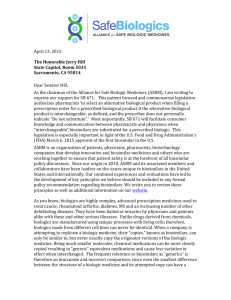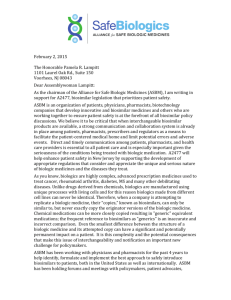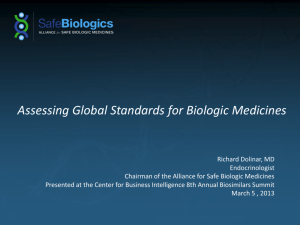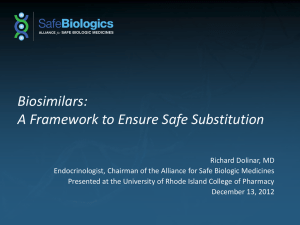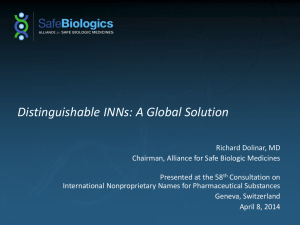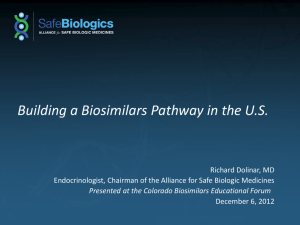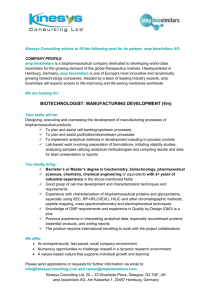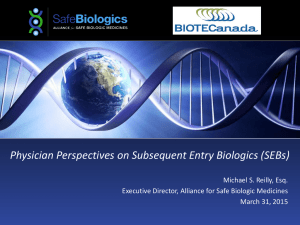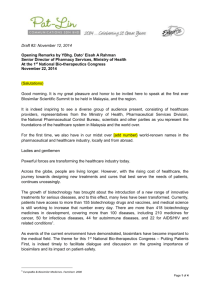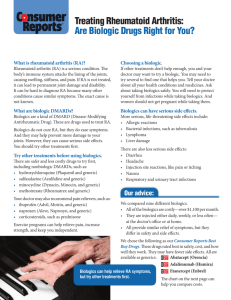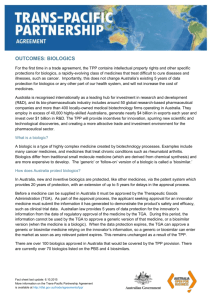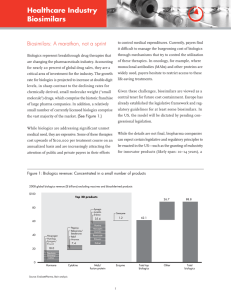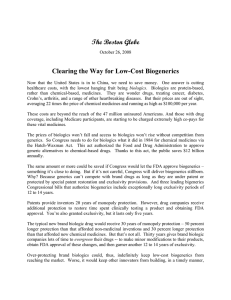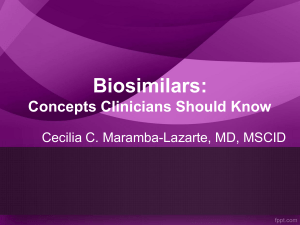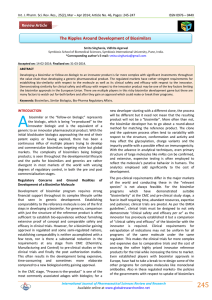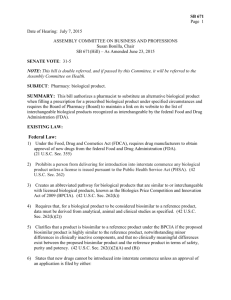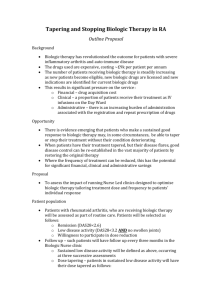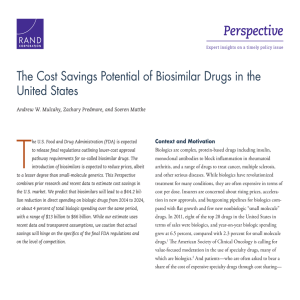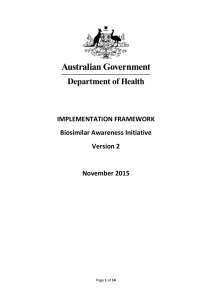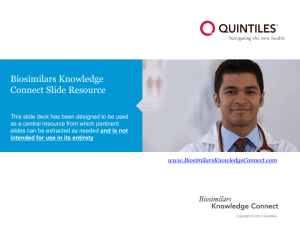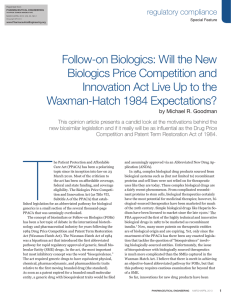ASBM Letter - Alliance for Safe Biologic Medicines
advertisement
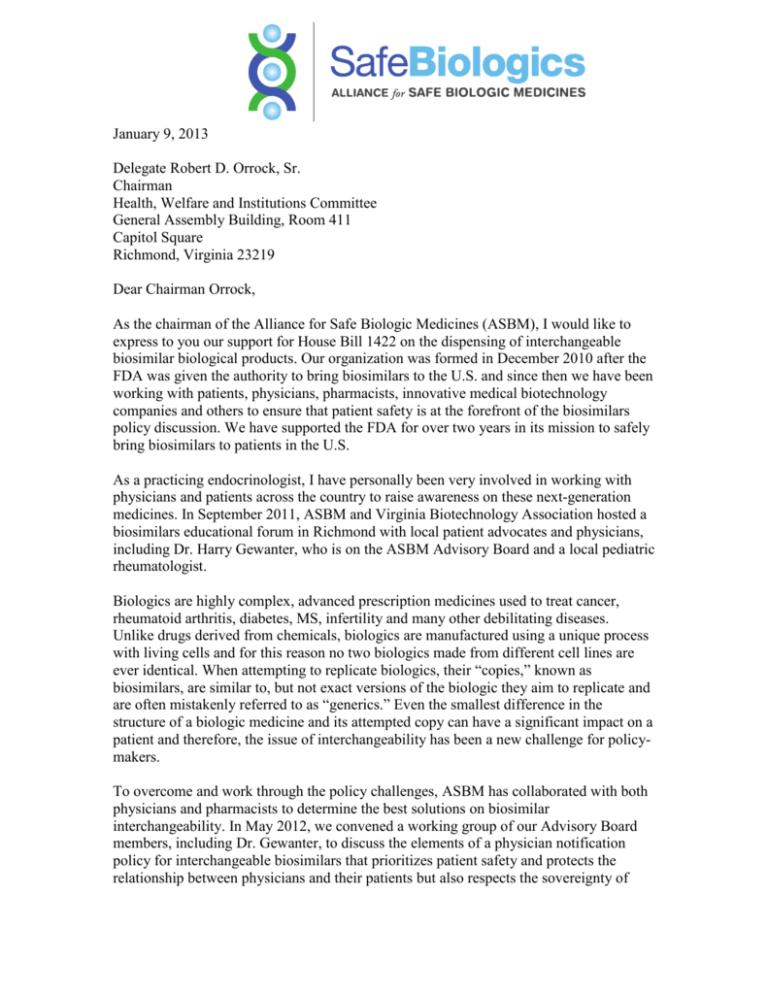
January 9, 2013 Delegate Robert D. Orrock, Sr. Chairman Health, Welfare and Institutions Committee General Assembly Building, Room 411 Capitol Square Richmond, Virginia 23219 Dear Chairman Orrock, As the chairman of the Alliance for Safe Biologic Medicines (ASBM), I would like to express to you our support for House Bill 1422 on the dispensing of interchangeable biosimilar biological products. Our organization was formed in December 2010 after the FDA was given the authority to bring biosimilars to the U.S. and since then we have been working with patients, physicians, pharmacists, innovative medical biotechnology companies and others to ensure that patient safety is at the forefront of the biosimilars policy discussion. We have supported the FDA for over two years in its mission to safely bring biosimilars to patients in the U.S. As a practicing endocrinologist, I have personally been very involved in working with physicians and patients across the country to raise awareness on these next-generation medicines. In September 2011, ASBM and Virginia Biotechnology Association hosted a biosimilars educational forum in Richmond with local patient advocates and physicians, including Dr. Harry Gewanter, who is on the ASBM Advisory Board and a local pediatric rheumatologist. Biologics are highly complex, advanced prescription medicines used to treat cancer, rheumatoid arthritis, diabetes, MS, infertility and many other debilitating diseases. Unlike drugs derived from chemicals, biologics are manufactured using a unique process with living cells and for this reason no two biologics made from different cell lines are ever identical. When attempting to replicate biologics, their “copies,” known as biosimilars, are similar to, but not exact versions of the biologic they aim to replicate and are often mistakenly referred to as “generics.” Even the smallest difference in the structure of a biologic medicine and its attempted copy can have a significant impact on a patient and therefore, the issue of interchangeability has been a new challenge for policymakers. To overcome and work through the policy challenges, ASBM has collaborated with both physicians and pharmacists to determine the best solutions on biosimilar interchangeability. In May 2012, we convened a working group of our Advisory Board members, including Dr. Gewanter, to discuss the elements of a physician notification policy for interchangeable biosimilars that prioritizes patient safety and protects the relationship between physicians and their patients but also respects the sovereignty of pharmacists as healthcare providers. We released a statement in October 2012 on the key principles that we believe should be included in a formal policy recommendations and we find HB 1422 to be in direct alignment with our principles, which included: (1) Physicians have the authority to specify “do not substitute” for biological products and that specification overrides any policy – e.g. by payers or state law – that would have substitution be the standard or default practice; (2) Physicians and pharmacists should work collaboratively to ensure that the treating physician is aware of the exact biologic – by manufacturer – given to a patient in order to facilitate patient care and accurate attribution of any adverse events that may occurs; (3) The timing of the notification process must not impose an undue burden on the pharmacist and need not be in advance of a substitution being made but must be timely enough to facilitate accurate record keeping and attribution of adverse events by the physician. As an organization dedicated to patient safety, we commend you for taking the necessary steps to ensure that patients are the top priority as biosimilars are introduced in the U.S and substituted for biologics in the Commonwealth of Virginia. Sincerely, Richard Dolinar, M.D. Chairman, The Alliance for Safe Biologic Medicines Members: Alliance for Patient Access American Academy of Dermatology American Association of People with Disabilities American Council on Science and Health Amgen Association of Black Cardiologists Association of Clinical Research Organizations Association of Gastrointestinal Motility Disorders, Inc. Biotechnology Industry Organization Colon Cancer Alliance Colorectal Cancer Coalition Genentech Global Healthy Living Foundation Interamerican College of Physicians and Surgeons International Cancer Advocacy Network Kidney Cancer Association MANA National Alliance on Mental Illness RetireSafe
